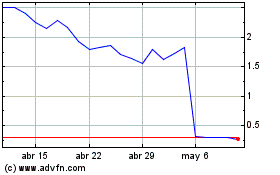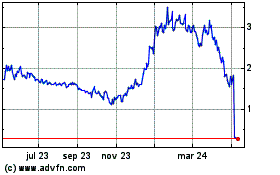Apollomics Completes Enrollment in Phase 3 Bridging Study of Uproleselan in Chinese Patients with Relapsed/Refractory Acute Myeloid Leukemia
03 Enero 2024 - 6:00AM

Apollomics Inc. (Nasdaq: APLM) (“Apollomics” or the “Company”), a
clinical-stage biopharmaceutical company developing medicines to
address difficult-to-treat cancers, today announced the completion
of enrollment in its Phase 3 bridging study evaluating uproleselan
(APL-106), an investigational, first-in-class E-selectin
antagonist, added to a standard chemotherapy regimen for the
treatment of adults with relapsed or refractory acute myeloid
leukemia (relapsed/refractory AML).
This Phase 3 bridging study is being performed
in China with Chinese r/r AML patients. A total of 140 adult
patients across 20 sites in Greater China with primary refractory
AML or relapsed AML (first or second untreated relapse) and
eligible to receive induction chemotherapy have been randomized to
either uproleselan combined with chemotherapy or placebo plus
chemotherapy. Apollomics licensed uproleselan from GlycoMimetics
(Nasdaq: GLYC), including the rights to clinical development,
production and commercial sales in the Greater China market
(Mainland China, Hong Kong, Macau and Taiwan).
“Uproleselan, as a potent E-selectin antagonist,
is the first in this novel mechanism class to be tested in Phase 3
AML studies, and has the potential to transform the care and
positively impact the outcomes of relapsed and refractory AML
patients,” said Dr. Jianxiang Wang, Chinese Academy of Medical
Sciences and Peking Union Medical College, Tianjin, China.
“AML is a highly aggressive hematological
cancer, and the prognosis of patients with relapsed or refractory
disease is extremely poor. AML remains a major unmet medical need
in China with an incidence of close to 40,000 patients every year.
Drug combinations targeting tumor-intrinsic and
microenvironment-extrinsic pathways of chemoresistance may provide
improved outcomes in this disease,” said Guo-Liang Yu, Chairman and
CEO of Apollomics, Inc. “As a potential first-in-class therapeutic
that addresses chemoresistance, uproleselan has the potential to be
transformative in patients with AML. I would also like to thank our
investigators, staff, as well as our clinical team and CRO
partners, for their commitment to completing this important
milestone.”
The primary endpoint for the Phase 3 bridging
study is overall survival. Secondary outcome measures include the
rate and duration of remission and whether uproleselan can reduce
the rate of oral mucositis, a chemotherapy-related side effect.
Additional information on the Phase 3 trial can be found on
clinicaltrials.gov (NCT05054543).
About UproleselanUproleselan
(APL-106) is an investigational, first-in-class E-selectin
antagonist discovered and developed by GlycoMimetics (Nasdaq:
GLYC), currently in a broad development program including a
late-stage Phase 3 trial in acute myeloid leukemia (AML).
Apollomics licensed uproleselan from GlycoMimetics, and Apollomics
has the rights to clinical development, production and commercial
sales in the Greater China market (Mainland China, Hong Kong, Macau
and Taiwan). Uproleselan has received Breakthrough Therapy and Fast
Track designations from the U.S. Food and Drug Administration and
Breakthrough Therapy designation from the Chinese National Medical
Products Administration for the treatment of adult AML patients
with relapsed or refractory disease. E-selectin is expressed on the
surface of blood vessels, and its binding to myeloid cells confers
a pro-survival effect via NF-kB signaling. Uproleselan is being
developed to provide a novel approach to disrupting established
mechanisms of leukemic cell resistance.
About Apollomics Inc.Apollomics
Inc. is an innovative clinical-stage biopharmaceutical company
focused on the discovery and development of oncology therapies with
the potential to be combined with other treatment options to
harness the immune system and target specific molecular pathways to
inhibit cancer. Apollomics currently has a pipeline of nine drug
candidates across multiple programs, six of which are currently in
the clinical stage of development. Apollomics’ lead programs
include vebreltinib (APL-101), a potent, selective c-Met inhibitor
for the treatment of non-small cell lung cancer and other advanced
tumors with c-Met alterations, and uproleselan (APL-106), a
specific E-Selectin antagonist that has the potential to be used
adjunctively with standard chemotherapy to treat acute myeloid
leukemia.
Cautionary Statement Regarding
Forward-Looking StatementsThis press release includes
statements that constitute “forward-looking statements” within the
meaning of the federal securities laws, including Section 27A of
the Securities Act of 1933, as amended (the “Securities Act”), and
Section 21E of the Securities Exchange Act of 1934, as amended (the
“Exchange Act”). All statements, other than statements of present
or historical fact included in this press release, are
forward-looking statements. When used in this press release, the
words “potential,” “could,” “should,” “will,” “may,” “believe,”
“estimate,” “expect,” the negative of such terms and other similar
expressions are intended to identify forward-looking statements,
although not all forward-looking statements contain such
identifying words. Forward-looking statements are based on
management’s current expectations and assumptions about future
events and are based on currently available information as to the
outcome and timing of future events. Apollomics cautions you that
its forward-looking statements are subject to unknown risks,
uncertainties and other factors that could cause actual results to
differ materially from those indicated in the Company’s
forward-looking statements, including: (i) the impact of any
current or new government regulations in the United States and
China affecting Apollomics’ operations and the continued listing of
Apollomics’ securities; (ii) the inability to achieve successful
clinical results or to obtain licensing of third-party intellectual
property rights for future discovery and development of Apollomics’
oncology projects; (iii) the failure to commercialize product
candidates and achieve market acceptance of such product
candidates; (iv) the failure to protect intellectual property, and
the risk of litigious claims, proceedings, litigation or other
types of disputes related to Apollomics’ business, licenses or
intellectual property; (v) breaches in data security; (vi) the risk
that Apollomics may not be able to develop and maintain effective
internal controls; (vii) unfavorable changes to the regulatory
environment; and those risks and uncertainties discussed in the
Annual Report on Form 20-F for the year ended December 31, 2022,
filed by Apollomics Inc. with the U.S. Securities and Exchange
Commission (“SEC”) on April 28, 2023, under the heading “Risk
Factors” and the other documents filed, or to be filed, by the
Company with the SEC. Additional information concerning these and
other factors that may impact the Company can be found in the
reports that Apollomics has filed and will file from time to time
with the SEC. These SEC filings are available publicly on the SEC’s
website at www.sec.gov. Forward-looking statements speak only as of
the date made by the Company. Apollomics undertakes no obligation
to update publicly any of its forward-looking statements to reflect
actual results, new information or future events, changes in
assumptions or changes in other factors affecting forward-looking
statements, except to the extent required by applicable law.
CONTACTS
Investor RelationsPeter
VozzoICR WestwickePeter.Vozzo@westwicke.com443-213-0505
Media RelationsSean LeousICR
WestwickeSean.Leous@westwicke.com646-866-4012
GlycoMimetics (NASDAQ:GLYC)
Gráfica de Acción Histórica
De Oct 2024 a Nov 2024

GlycoMimetics (NASDAQ:GLYC)
Gráfica de Acción Histórica
De Nov 2023 a Nov 2024




